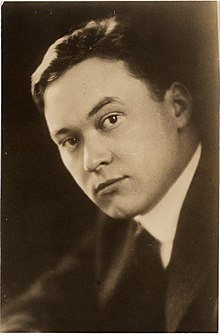Walter Lippmann
| Walter Lippmann | |
|---|---|

Walter Lippmann in 1914
|
|
| Born |
September 23, 1889 New York City, New York, U.S. |
| Died | December 14, 1974 (aged 85) New York City, New York, U.S. |
| Occupation | Writer, journalist, political commentator |
| Nationality | American |
| Education | Timothy Dwight School |
| Alma mater | Harvard University A.B. (1910) |
| Notable works | Founding editor, New Republic, Public Opinion |
| Notable awards |
Pulitzer Prize, 1958, 1962 Presidential Medal of Freedom |
| Relatives | Jacob and Daisy Baum Lippmann |
Pulitzer Prize, 1958, 1962
Walter Lippmann (September 23, 1889 – December 14, 1974) was an American writer, reporter, and political commentator famous for being among the first to introduce the concept of Cold War, coining the term "stereotype" in the modern psychological meaning, and critiquing media and democracy in his newspaper column and several books, most notably his 1922 book Public Opinion. Lippmann was also a notable author for the Council on Foreign Relations, until he had an affair with the editor Hamilton Fish Armstrong's wife, which led to a falling out between the two men. Lippmann also played a notable role in Woodrow Wilson's post World War I board of inquiry, as its research director. His views regarding the role of journalism in a democracy were contrasted with the contemporaneous writings of John Dewey in what has been retrospectively named the Lippmann-Dewey debate. Lippmann won two Pulitzer Prizes, one for his syndicated newspaper column "Today and Tomorrow" and one for his 1961 interview of Nikita Khruschev.
He has also been highly praised with titles ranging anywhere from "most influential" journalist of the 20th century, to Father of Modern Journalism.
Michael Schudson writes that James W. Carey considered Walter Lippmann's book Public Opinion as "the founding book of modern journalism" and also "the founding book in American media studies".
Walter Lippmann was born in New York City, to Jacob and Daisy Baum Lippmann; his upper-middle class German Jewish family took annual holidays in Europe. At 17, following his graduation from New York's Dwight School, he entered Harvard University where he studied under George Santayana, William James, and Graham Wallas, concentrating upon philosophy and languages (he spoke German and French), and he earned his degree in three years, graduating as a member of the Phi Beta Kappa society.
...
Wikipedia
